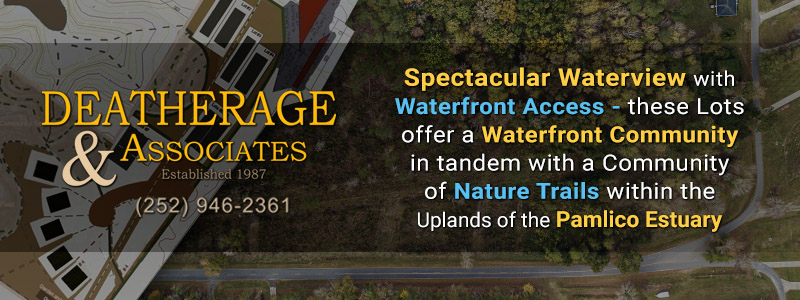In Difficult Times Good People gravitate towards Absolute Truth
Mostly Hope
Publisher's note: The author of this post, Amy Ellis, is a contributor to ECU News Services.
Five-year-old Christian McLawhorn won't stop talking. And his mother Sharon is thrilled about it.
When Christian was diagnosed with autism spectrum disorder two years ago, he was almost entirely nonverbal. "He would just repeat the last word that was said to him," she said.
The McLawhorns, of Chicod, sought help from Dr. Michael Reichel, a developmental and behavioral specialist in East Carolina University's pediatrics department, who provided them with "lots of information, lots of support, but mostly hope," McLawhorn said.
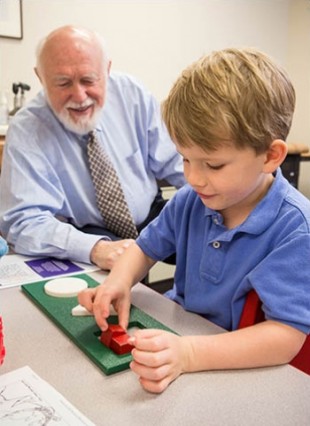 The expertise Christian's family benefitted from is poised to help more families like his through ECU Physicians' multidisciplinary Family Autism Center in Winterville.
The expertise Christian's family benefitted from is poised to help more families like his through ECU Physicians' multidisciplinary Family Autism Center in Winterville.
According to Reichel, the center's director, their goal is "to help parents and professionals in our region navigate the complex systems of diagnosis, the behavioral and educational care, and social and community supports available for families dealing with autism spectrum disorder."
Autism spectrum disorder refers to a group of developmental disabilities that affect how a person understands what they see, hear or sense, according to information published by the Autism Society of North Carolina. People with ASD typically have difficulty understanding verbal and nonverbal communication and learning appropriate ways of behaving and interacting socially.
ASD affects individuals differently and with varying degrees of severity, Reichel said.
"The cliché we like to use is, 'if you've seen one child with autism, you've seen one child with autism,'" he said.
"Yes, the early signs are often related to the core deficit of social communication," he added. "And many autistic kids line their toys up in rows and flap their hands. But not all kids who do these things are autistic."
The prevalence of autism in North Carolina continues to increase, with more males than females being identified, according to Centers for Disease Control and Prevention estimates.
Reichel and his colleague, Dr. Barbara Samuels, are on a mission to make early and accurate diagnosis – and early intervention – the norm for eastern North Carolina.
"Early identification and intervention provides the most positive outcomes," said Reichel. "That means we need to educate other medical providers. We also need to train teachers, school administrators, babysitters and other caregivers because they're often the first to notice the early signs."
Despite ongoing research, no one knows exactly what causes ASD, and there is no single test to diagnose it, Reichel said. "Accurate diagnosis is made by a team of multidisciplinary professionals who have observed a person's communication, behavior and developmental levels – combined with caregiver input and developmental history," he said. "It's a process, not a one-stop shop."
Treatment of ASD should involve multiple disciplines, as well, Reichel said. That's why he, Samuels and other organizers envision the center as an interdisciplinary hub for autism treatment in the community and region.
The center is already providing developmental testing and screening tools that can identify children who might have autism spectrum disorders, developmental delays, pragmatic communication disorder, attention deficit hyperactivity disorder and other related conditions.
But the plan is to round out the current physician and nursing staff with a feeding specialist, a speech language pathologist, a psychologist, an occupational therapist and social workers.
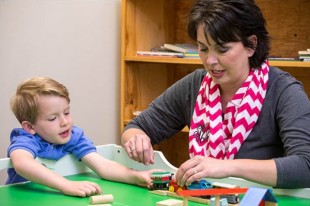 "Our goal is to recognize the unique strengths in each of these individuals and help them develop the particular skills and strategies they'll need to master life's challenges," Reichel said. "Many children like Christian are making substantial progress."
"Our goal is to recognize the unique strengths in each of these individuals and help them develop the particular skills and strategies they'll need to master life's challenges," Reichel said. "Many children like Christian are making substantial progress."
To further that goal, the center hopes to serve as a navigational beacon and informational clearinghouse for the many resources available in the region for people with ASD.
Valuable resources, community supports, advocacy groups and opportunities are already in place here, Reichel said, but they need to be linked and coordinated. "We don't have to reinvent these things; we just have to help families navigate them," he said. "We want families to be grounded in the services that are here so they'll be grounded in reality."
Organizers envision the center as an interdisciplinary training site, as well as a clinical research site, down the road. And there are plans to support the needs of the adult autism community, too.
"Our center is unique because we're laying the groundwork to serve individuals with autism across the entire lifespan," Samuels said. "ASD is typically diagnosed in children, but it's a lifelong disorder. It doesn't go away when a person reaches adulthood."
Sharon McLawhorn said she was initially devastated by Christian's diagnosis. "I first came to Dr. Reichel crying," she said, "but he helped me understand it wasn't a life sentence to isolation or to lack of success – it was an opportunity, instead."
Christian is slated to begin kindergarten this fall – right on schedule and fully integrated in a regular classroom.
Although success will be defined differently in different cases, McLawhorn is confident that families who take advantage of the Family Autism Center's resources will experience some measure of success as a result.
"This place is a safe haven for the kids and their families," she said. "It's where parents can learn from other parents and staff. Where they can get the knowledge and tools to help their child and to advocate for their child. Where they can get support and hope.
"This center is so important," she said. "I'm so glad it's finally here."
The ECU Physicians Family Autism Center is located at 108-B West Fire Tower Road in Winterville. For more information visit www.ecu.edu/cs-dhs/ecuphysicians/locationinfo.cfm?ID=55.
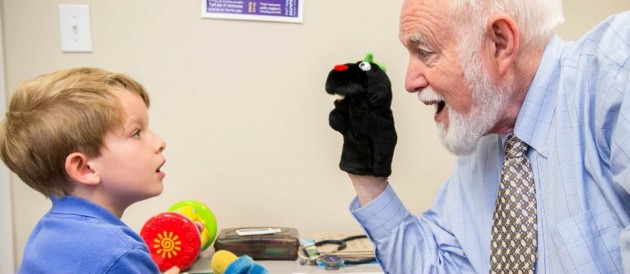
Christian McLawhorn, left, listens as Dr. Michael Reichel interacts with him using a hand puppet at the ECU Physicians Family Autism Center. Techniques Christian's family learned from Reichel are helping him master new communication skills like "joint attention," the ability to share a focus with another individual on the same object.
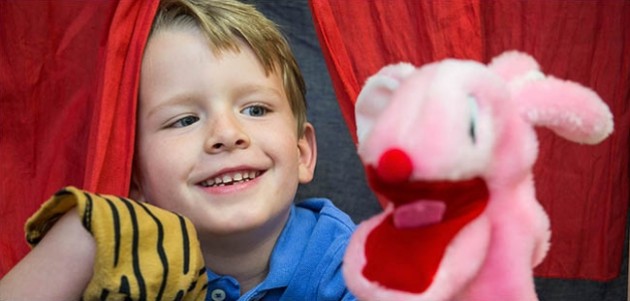
Christian uses puppets to demonstrate his improved communication skills. Activities at the autism center have helped Christian transition from being almost entirely nonverbal to being an outgoing conversationalist.
Go Back
ECU center offers support for families dealing with autism
Five-year-old Christian McLawhorn won't stop talking. And his mother Sharon is thrilled about it.
When Christian was diagnosed with autism spectrum disorder two years ago, he was almost entirely nonverbal. "He would just repeat the last word that was said to him," she said.
The McLawhorns, of Chicod, sought help from Dr. Michael Reichel, a developmental and behavioral specialist in East Carolina University's pediatrics department, who provided them with "lots of information, lots of support, but mostly hope," McLawhorn said.

Reichel observes as Christian works a puzzle. (Photos by Cliff Hollis)
According to Reichel, the center's director, their goal is "to help parents and professionals in our region navigate the complex systems of diagnosis, the behavioral and educational care, and social and community supports available for families dealing with autism spectrum disorder."
Autism spectrum disorder refers to a group of developmental disabilities that affect how a person understands what they see, hear or sense, according to information published by the Autism Society of North Carolina. People with ASD typically have difficulty understanding verbal and nonverbal communication and learning appropriate ways of behaving and interacting socially.
ASD affects individuals differently and with varying degrees of severity, Reichel said.
"The cliché we like to use is, 'if you've seen one child with autism, you've seen one child with autism,'" he said.
"Yes, the early signs are often related to the core deficit of social communication," he added. "And many autistic kids line their toys up in rows and flap their hands. But not all kids who do these things are autistic."
The prevalence of autism in North Carolina continues to increase, with more males than females being identified, according to Centers for Disease Control and Prevention estimates.
Reichel and his colleague, Dr. Barbara Samuels, are on a mission to make early and accurate diagnosis – and early intervention – the norm for eastern North Carolina.
"Early identification and intervention provides the most positive outcomes," said Reichel. "That means we need to educate other medical providers. We also need to train teachers, school administrators, babysitters and other caregivers because they're often the first to notice the early signs."
Despite ongoing research, no one knows exactly what causes ASD, and there is no single test to diagnose it, Reichel said. "Accurate diagnosis is made by a team of multidisciplinary professionals who have observed a person's communication, behavior and developmental levels – combined with caregiver input and developmental history," he said. "It's a process, not a one-stop shop."
Treatment of ASD should involve multiple disciplines, as well, Reichel said. That's why he, Samuels and other organizers envision the center as an interdisciplinary hub for autism treatment in the community and region.
The center is already providing developmental testing and screening tools that can identify children who might have autism spectrum disorders, developmental delays, pragmatic communication disorder, attention deficit hyperactivity disorder and other related conditions.
But the plan is to round out the current physician and nursing staff with a feeding specialist, a speech language pathologist, a psychologist, an occupational therapist and social workers.

Sharon McLawhorn, right, and son Christian work together on a train set as part of Christian's activities at the center for patients with Autism Spectrum Disorder. McLawhorn said the Family Autism Center staff helped her see Christian's diagnosis as an opportunity rather than a "life sentence."
To further that goal, the center hopes to serve as a navigational beacon and informational clearinghouse for the many resources available in the region for people with ASD.
Valuable resources, community supports, advocacy groups and opportunities are already in place here, Reichel said, but they need to be linked and coordinated. "We don't have to reinvent these things; we just have to help families navigate them," he said. "We want families to be grounded in the services that are here so they'll be grounded in reality."
Organizers envision the center as an interdisciplinary training site, as well as a clinical research site, down the road. And there are plans to support the needs of the adult autism community, too.
"Our center is unique because we're laying the groundwork to serve individuals with autism across the entire lifespan," Samuels said. "ASD is typically diagnosed in children, but it's a lifelong disorder. It doesn't go away when a person reaches adulthood."
Sharon McLawhorn said she was initially devastated by Christian's diagnosis. "I first came to Dr. Reichel crying," she said, "but he helped me understand it wasn't a life sentence to isolation or to lack of success – it was an opportunity, instead."
Christian is slated to begin kindergarten this fall – right on schedule and fully integrated in a regular classroom.
Although success will be defined differently in different cases, McLawhorn is confident that families who take advantage of the Family Autism Center's resources will experience some measure of success as a result.
"This place is a safe haven for the kids and their families," she said. "It's where parents can learn from other parents and staff. Where they can get the knowledge and tools to help their child and to advocate for their child. Where they can get support and hope.
"This center is so important," she said. "I'm so glad it's finally here."
The ECU Physicians Family Autism Center is located at 108-B West Fire Tower Road in Winterville. For more information visit www.ecu.edu/cs-dhs/ecuphysicians/locationinfo.cfm?ID=55.

Christian McLawhorn, left, listens as Dr. Michael Reichel interacts with him using a hand puppet at the ECU Physicians Family Autism Center. Techniques Christian's family learned from Reichel are helping him master new communication skills like "joint attention," the ability to share a focus with another individual on the same object.

Christian uses puppets to demonstrate his improved communication skills. Activities at the autism center have helped Christian transition from being almost entirely nonverbal to being an outgoing conversationalist.
| First-Class Access | East Carolina University, School News, The Region, Neighboring Counties | North Carolina premiere of Farmland movie |













